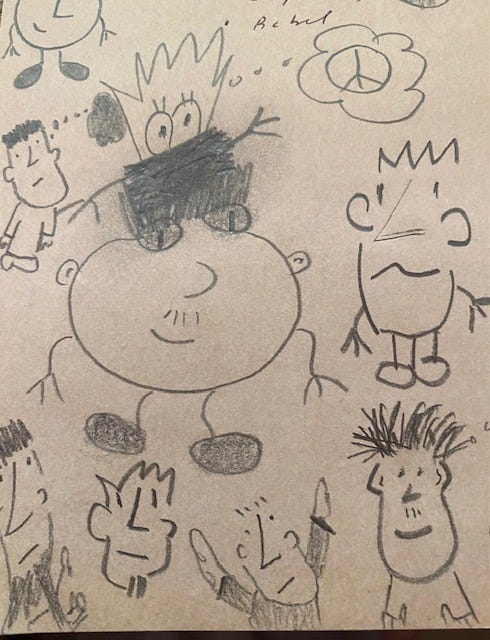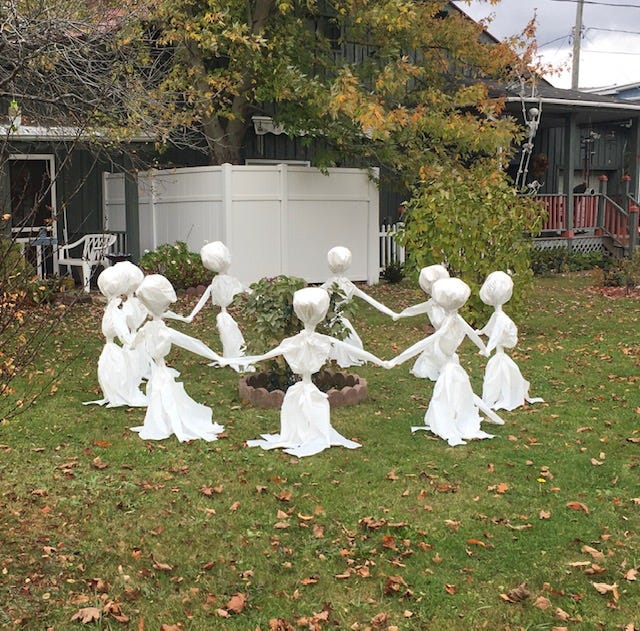Thanks so much for being part of Story Club.
Before we leap in, I thought it might be good to talk a little about how this is supposed to work – how I’m going to approach it, and how I hope you will.
We might think of this as our first class together – me standing nervously at the board as you sit out there with your fresh new notebooks, looking out longingly at the late-summer day because, in Story Club, it’s always fall semester.
Trust Me, But Only for a Little While
I like to start my class at Syracuse by asking my students to mentally open a set of parentheses, and precede the first one with the phrase, “According to George,” And, for the rest of the semester, I ask them to believe, or try to believe, or at least conditionally accept, my approach (my theories, my silly drawings on the board, my strained metaphors that don’t quite hold together under closer examination). This gives me permission to be as persuasive and passionate as I can, as I try to convey my sense of how (for me) this writing thing works.
Their part in this (your part in this) is to try to stay open - to temporarily accept my view, try it on, see what sticks. If something that I say makes sense or causes a positive reverberation or a little confidence-burst: perfect. That’s just you recognizing something you already knew but maybe haven’t come to fully believe in yet (but should).
So, teaching can be a form of permission-giving.
There follows a semester of me pitching various views of the short story, and of how we should read, and of the revision process and so on. Their openness means that whatever possible benefit these notions might have, they are more likely to receive.
Then, at the end of the semester, I ask them to close the parentheses and follow that second parenthesis with this phrase, “That was all just according to George, and I may now discard.”
Whatever has stuck, they keep; whatever didn’t speak to them, I urge them to brush aside.

Why We’re Doing This
The main thing we’re going to be doing here in Story Club: I’ll provide a story (or part of one) and we’ll read it together and try to figure how it works. (I considered calling this Story Morgue but, imagining the possible graphic, thought better of it.)
Your Part Is…
I think of teaching as a form of genial provocation. If a student winds up at Syracuse, he or she is already wildly talented, is already being impelled forward by a powerful urge to create. Likewise, with you: if you’re here, you already have some sort of internal engine driving you forward in your reading/writing life. The assumption is, if the right sort of challenge is put in your path, your talent will grow around it and put it to work – your subconscious will use that challenge to cause growth. And this is true even if the challenge is a little strange, or off, or not perfectly suited to you.
I’ve used this metaphor to describe what a creative writing program can do, and I think it applies here too: the writer is a person running through some winter woods, wearing ice skates. The creative writing program (or Story Club) is a frozen pond that suddenly appears: you are, of course, still using your own natural energy (because what else could you use?), are still headed in “your” direction – only now, you’re moving faster.
So, as in that metaphor, the writer doesn’t have to worry, or obsess, or get her ducks in a row, or plan – she just has to skate, which means she has to be energetic in relation to the challenges the teacher puts in front of her; willing to playfully assume that taking them on, with energy, might (might) be beneficial, in a spirit of: “Well, what the heck – it might help.”
As the Optometrist Says: Is This Better? Or This?
All a teacher of an art form has to offer, really, are metaphors (epigrams, wisdom-nuggets, scale models). None of these are true or correct or sufficient or all-inclusive or required or true-for-everyone. They’re just ways of seeing the thing – attempts at genially provoking the student. The teacher is always just offering – saying, “Does this help? How about this? What happens if you think of it this way?”
So, the essential work involves an offering (in a playful, exploratory spirit) on the teacher’s part, and an openness to receive on the student’s. (A good teaching mantra is: “Is this helping?”)
So, one thing I’ll ask of you: let me know, via the Comments feature, how things are going. What questions are being raised for you? Are you finding certain approaches more helpful than others? Are there things you’re wondering about? Most of all: if something in your reading/writing life is causing you anxiety, ask about it. I’ve come to believe that one of the essential jobs of a teacher is to reduce the student’s anxiety (thereby making her process open to more joy/celebration/fun.)
And We’re Off
So, imagine that we’ve just finished the first day of class – that easy intro class that never goes the full three hours, and now you’re walking home across the campus, waiting for the real work of the semester to begin…a good moment to dream a little, and entertain the highest aspirations.

Oh, and speaking of that, one more thing – per Buddhist practice, let’s start this adventure with an aspiration that everything we’re going to do in Story Club will, in some way, be beneficial, to ourselves, yes, but also to other people and even, we hope, to the world (another form of keeping ourselves honest and on-track).
See you soon, and thanks again for being part of this.
P.S. Next post, I’m going to write a little about my revision process, which also informs the way I read and analyze stories by other people.
P. P. S. I want to thank everyone who responded so generously to my “Getting to Know You” post. It was amazing, and so helpful. It helped me imagine you, out there. Mainly, it made me feel that I can really swing for the fences – be frank and rigorous and technical and can, as needed, grope around a little when I’m not entirely sure what I’m trying to say, trusting that you’ll bear with me. What a privilege, to have a chance to work with so many accomplished, curious, and open people. Thank you for responding like that – it felt like a great beginning.








If I'm really going to try to do this all the way, and I intend to, then I suppose I need to confess what actually makes me anxious about writing now. My fear is that I won't be heard through all the other voices. As a younger writer, I was up for the fight, taking on other voices head to head, always pushing to be more concise, engaging, and dominant. In my memory, I think it was almost fun to struggle in the crowd this way. Life has since softened me, perhaps broken open my heart. Fighting for ears to listen has become so much less appealing. My love for writing hasn't diminished at all. When I sit at my desk, I believe I can truly create anything. But my army I once had to advance on the intense competition has fallen back. I'm embarrassed to admit that I'm actually sitting here in a cafe crying secretively because I fear that I don't know how to continue fighting for my work to be read. But I do appreciate this community very much and everything that you're giving us here, Mr. Saunders. This feels like a lovely bunch of people that have come together. I am going to do what you asked of us and trust this until our work is complete.
Establishing authority within brackets of humility on the first day of class. I wish more of my professors had the wisdom to do that. Smashing start to this journey, George!